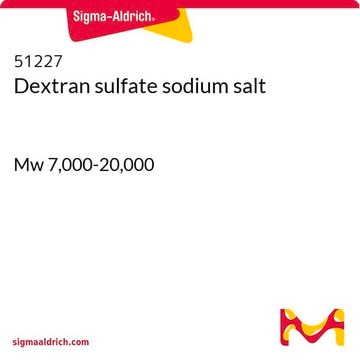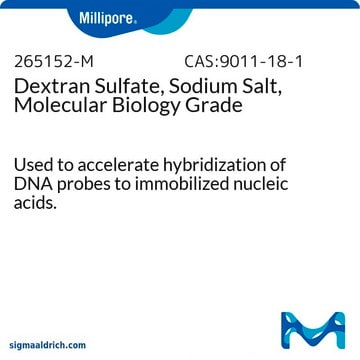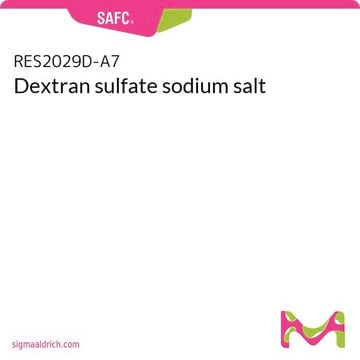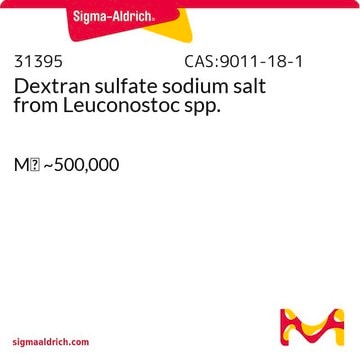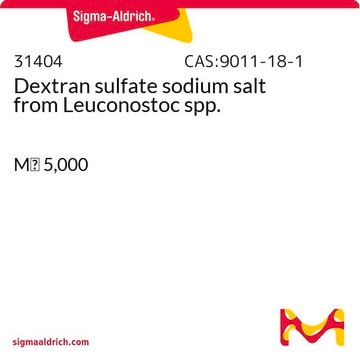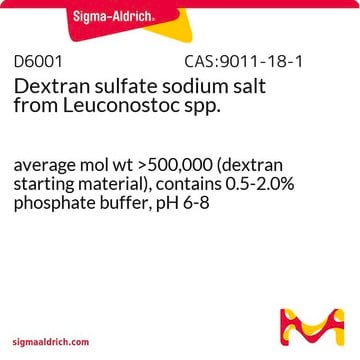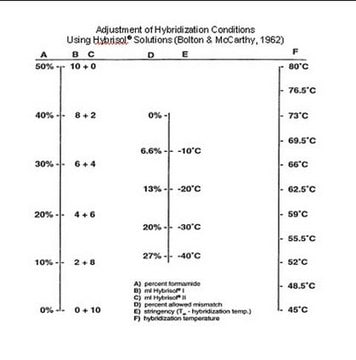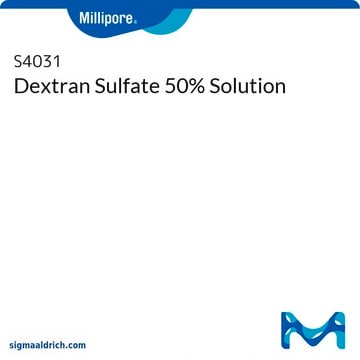If this product has an expiration or retest date, it will be shown on the Certificate of Analysis (COA, CofA). If there is no retest or expiration date listed on the product's COA, we do not have suitable stability data to determine a shelf life. For these products, the only date on the COA will be the release date; a retest, expiration, or use-by-date will not be displayed.
For all products, we recommend handling per defined conditions as printed in our product literature and website product descriptions. We recommend that products should be routinely inspected by customers to ensure they perform as expected.
For products without retest or expiration dates, our standard warranty of 1 year from the date of shipment is applicable.
For more information, please refer to the Product Dating Information document: https://www.sigmaaldrich.com/deepweb/assets/sigmaaldrich/marketing/global/documents/449/386/product-dating-information-mk.pdf
42867
Sulfate de dextrane sodium salt
Mr ~40,000
Synonyme(s) :
Sulfate de dextrane sodique DSS
About This Item
Produits recommandés
Forme
powder
Poids mol.
Mr ~40,000
Perte
≤10% loss on drying
Couleur
white to off-white
Plage de pH utile
6.0-8 (10 g/L)
Pf
(Decomposes on heating.)
Solubilité
water: soluble
Température de stockage
room temp
Vous recherchez des produits similaires ? Visite Guide de comparaison des produits
Description générale
Application
Actions biochimiques/physiologiques
Code de la classe de stockage
11 - Combustible Solids
Classe de danger pour l'eau (WGK)
WGK 2
Point d'éclair (°F)
Not applicable
Point d'éclair (°C)
Not applicable
Faites votre choix parmi les versions les plus récentes :
Déjà en possession de ce produit ?
Retrouvez la documentation relative aux produits que vous avez récemment achetés dans la Bibliothèque de documents.
Les clients ont également consulté
Articles
Centrifugation enables the separation of particles by sedimentation. Learn how to separate particles using a centrifuge and how to use Stokes' law to calculate the velocity of sedimentation.
Centrifugation enables the separation of particles by sedimentation. Learn how to separate particles using a centrifuge and how to use Stokes' law to calculate the velocity of sedimentation.
Centrifugation enables the separation of particles by sedimentation. Learn how to separate particles using a centrifuge and how to use Stokes' law to calculate the velocity of sedimentation.
Centrifugation enables the separation of particles by sedimentation. Learn how to separate particles using a centrifuge and how to use Stokes' law to calculate the velocity of sedimentation.
-
How can I determine the shelf life / expiration / retest date of this product?
1 answer-
Helpful?
-
-
How is shipping temperature determined? And how is it related to the product storage temperature?
1 answer-
Products may be shipped at a different temperature than the recommended long-term storage temperature. If the product quality is sensitive to short-term exposure to conditions other than the recommended long-term storage, it will be shipped on wet or dry-ice. If the product quality is NOT affected by short-term exposure to conditions other than the recommended long-term storage, it will be shipped at ambient temperature. As shipping routes are configured for minimum transit times, shipping at ambient temperature helps control shipping costs for our customers. For more information, please refer to the Storage and Transport Conditions document: https://www.sigmaaldrich.com/deepweb/assets/sigmaaldrich/marketing/global/documents/316/622/storage-transport-conditions-mk.pdf
Helpful?
-
-
Does DDS (Dextran Sodium Sulfate) come in a USP grade for a animal studies?
1 answer-
Unfortunately, there is no pharmaceutical grade Dextran Sodium Sulfate available at this time. This product is not tested for use in animal models. It would be up to the researcher to determine suitability.
Helpful?
-
-
Hello! I want to know if you can autoclave water with 4% of dextran sulfate sodium (DSS) without decomposing the DSS.
1 answer-
The solubility of dextran sulfates is tested at 100 mg/mL in water. Clear solutions are obtained. Buffered aqueous dextran sulfate solutions can be sterilized by autoclaving at 110-115 °C for 30 to 45 minutes. Dextran can be hydrolyzed by strong acids at high temperatures. Dextran sulfate has a higher affinity for calcium ions than for sodium ions. The calcium salt of dextran sulfate is insoluble. The free acid (hydrogen) form of dextran sulfate is extremely acidic and autohydrolyzes rapidly in solution and as a powder.
More information can be found here: https://www.sigmaaldrich.com/technical-documents/protocol/protein-biology/protein-pulldown/dextran-sulfate
Helpful?
-
Active Filters
Notre équipe de scientifiques dispose d'une expérience dans tous les secteurs de la recherche, notamment en sciences de la vie, science des matériaux, synthèse chimique, chromatographie, analyse et dans de nombreux autres domaines..
Contacter notre Service technique
